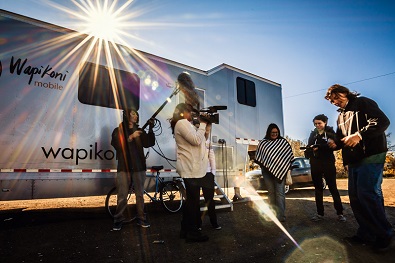Photo courtesy of wapikoni.ca
Pelican Narrows will be home to a different type of summer camp for the month of July.
The Wapikoni travelling audiovisual creation studio will spend one month in the community to offer free practical audiovisual and musical training workshops adapted to the realities of the community’s youth.
Since 2004, Wapikoni has visited over 32 communities in Canada and accompanied over 4,300 participants who worked to direct close to 1,000 short films translated into several languages. These films have received 146 awards and honours at national and international festivals.
The crew is made up of two filmmaker mentors, an Indigenous assistant filmmaker mentor, a local youth outreach worker and a coordinator from the community. Participants in the summer program will learn about screenwriting, directing and in the numerous technical aspects of filmmaking.
Aleyna May Morin is the outreach worker for the Pelican Narrows project. She says that this is the first time Wapikoni has travelled into Western Canada to work with First Nations youth. She says it will give youth an opportunity to learn all about what goes into making a film.
“The goal is to reach out to youth ages 16 to 35, but the project doesn’t exclude younger kids. If there are younger kids that want to get involved, they could help out as a camera crew member,” she adds.
She hopes that other people in the community get involved by sharing their stories with the youth.
“It will make connections with their families and hopefully build a strong artistic view of the way that they live,” she says.
The summer camp kicks off this week, and people around the community won’t miss the big trucks that will be parked at the school. Morin says response to the project has been good as students who may be looking at media arts in the future are inquiring about it.
“We just started putting up posters about it last week, but kids have been asking how they can get involved,” she says.
At the end of the workshop, participants present their works during a community screening for up to 150 people on July 27.
